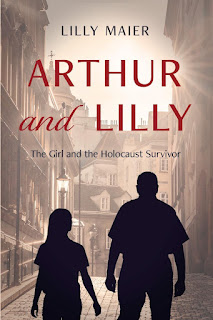Lilly Maier is the author of the new book Arthur and Lilly: The Girl and the Holocaust Survivor. It focuses on her friendship with Holocaust survivor Arthur Kern. She is a doctoral candidate at the University of Munich.
Q: Why did you decide to write Arthur and Lilly?
A: I was 11 years old when I first met Arthur. The meeting and everything that followed it had a huge impact on my life and it inspired me to become a historian.
While I am not exactly sure when I decided to write the book, I have long felt that it was a story I wanted to tell. For example, when I visited Arthur for the first time, I wrote everything down in a diary. But I usually didn’t keep a diary, so even at age 16 I felt like I wanted to remember everything.
The first time I started writing the story was during a semester abroad at American University in Washington, D.C. In a journalism class, I wrote an essay which would later become the prologue of the book. During my graduate studies at journalism school at NYU I continued working on the story and wrote two chapters.
At the same time, I was pursuing graduate studies in history and did two extensive studies about the Kindertransport rescue effort that saved Arthur and hundreds of other Jewish kids. So I was coming at the story from a historical and from a journalistic angle and it was a natural development to turn it into a book.
At the time, it was suggested to me that I should write Arthur and Lilly as a novel, because it would sell better, but I could never do that. The story is too real for me and was such an important part of my life that I could never pretend to have made it up.
Q: How would you describe the dynamic between you and Arthur Kern?
A: It was very much a grandfather-granddaughter dynamic. I was 11 when I met him and he was in his 70s. Both he and his wife Trudie very soon started introducing me to people as their “Austrian granddaughter” and luckily his real granddaughters never had a problem with that.
To this day, I am incredibly close with his entire family, I attend weddings, Thanksgivings, and so much more.
What also influenced our relationship was that we spoke the “same” language. Arthur’s German was still very good, but he had the vocabulary of a 10-year-old-boy, because he never learned any grown-up words in German after his escape. And I was 11, so our language was very similar. I was about 15 or 16 when we switched to speaking English.
Q: How did you research the book, and what did you learn that especially surprised you?
A: I researched this book in various ways. I interviewed Arthur and a lot of his friends, as well as historians and archivists who researched aspects of the story. I am a historian myself, so I did a lot of archival research in New York, Washington, Paris and Vienna, where I read thousands of documents.
I also traced Arthur’s rescue by travelling to all the places he spent time at and speaking to people there. I describe all this in the book to show not only the history, but also the sometimes detective-like work that goes into finding out about it.
What surprised me was the sheer bureaucracy of it all. It was the middle of a war, but for each child dozens of forms had to be filled out to be even considered for a chance of rescue.
If you read all the letters in the archives from the dozens of organizations involved, you sometimes wonder how they managed to save even a single child. But they did, and not only one but a couple of hundred.
Q: What do you hope readers take away from the book?
A: I hope that people take away a positive message from the book. Even though everything he went through, Arthur was an incredibly happy and optimistic man who made the very conscious choice to stop hating.
With everything that is going on right now, I do hope that people get inspired by his story and his attitude.
Q: What are you working on now?
A: I am in the final phase of finishing my Ph.D. thesis. It’s about Jewish women who rescued Jews during the Holocaust. Most of the rescue was done by women, but almost no one knows this.
I am also involved in various Holocaust education projects, including with the United States Holocaust Memorial Museum in D.C. And to the nearer future: I am spending until the middle of December on my book tour through the US, spanning 10 states and Canada.
Q: Anything else we should know?
A: A lot of biographies about Holocaust survivors end in 1945. And even more so autobiographies that people wrote in their 70s or 80s - they describe their prewar life, then the war and the Holocaust at length and then the - much longer - rest of their lives in a couple of pages.
For me, it was very important to continue telling Arthur’s story to the present. He was just a teenager when the war ended and there was so much more to happen.
--Interview with Deborah Kalb


No comments:
Post a Comment